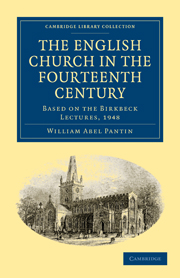Book contents
- Frontmatter
- Contents
- Preface
- List of Abbreviations
- I INTRODUCTION: THE LEGACY OF THE THIRTEENTH CENTURY
- PART I CHURCH AND STATE
- PART II INTELLECTUAL LIFE AND CONTROVERSY
- PART III RELIGIOUS LITERATURE
- IX MANUALS OF INSTRUCTION FOR PARISH PRIESTS
- X RELIGIOUS AND MORAL TREATISES IN THE VERNACULAR
- XI ENGLISH MYSTICAL LITERATURE OF THE FOURTEENTH CENTURY
- Appendix I The Latin text of passages quoted from manuscript sources
- Appendix II Two collections of didactic treatises
- Index
X - RELIGIOUS AND MORAL TREATISES IN THE VERNACULAR
Published online by Cambridge University Press: 10 November 2010
- Frontmatter
- Contents
- Preface
- List of Abbreviations
- I INTRODUCTION: THE LEGACY OF THE THIRTEENTH CENTURY
- PART I CHURCH AND STATE
- PART II INTELLECTUAL LIFE AND CONTROVERSY
- PART III RELIGIOUS LITERATURE
- IX MANUALS OF INSTRUCTION FOR PARISH PRIESTS
- X RELIGIOUS AND MORAL TREATISES IN THE VERNACULAR
- XI ENGLISH MYSTICAL LITERATURE OF THE FOURTEENTH CENTURY
- Appendix I The Latin text of passages quoted from manuscript sources
- Appendix II Two collections of didactic treatises
- Index
Summary
In considering this type of literature, we are faced, as we all know, with a most alarming mass of material; contemporaries admitted that it would take a lifetime to read it all. Our task is all the more difficult, because in the past scholars have tended to consider these works from the linguistic and literary point of view, rather than as a body of theological or historical material; one is more likely to find such a work as Handling Sin or the Azenhite of lnwit as a prescribed text in an English hterature course than in a theological or historical course. Yet these works are of vital interest to the ecclesiastical historian and the historian of theology, and one cannot get a complete picture of the fourteenth-century English Church without trying to understand them, so that it is at least worth making an attempt to analyse and classify them.
What were the sources of these works? As regards their doctrine, the sources were of course manifold. They were specially influenced by the great thirteenth-century treatises on Vices and Virtues, the work of French theologians like the Dominican William Perrault or Peraldus (d. 1260) and William of Auvergne, Bishop of Paris (d. 1249), and the Somme le roi of the Dominican Friar Lorens (c. 1279). Considerable use was also made of works rightly or wrongly attributed to the Fathers, either directly from the original texts, or at second hand from the ‘tables’ and anthologies so popular in the later Middle Ages.
- Type
- Chapter
- Information
- The English Church in the Fourteenth CenturyBased on the Birkbeck Lectures, 1948, pp. 220 - 243Publisher: Cambridge University PressPrint publication year: 2010First published in: 1955



